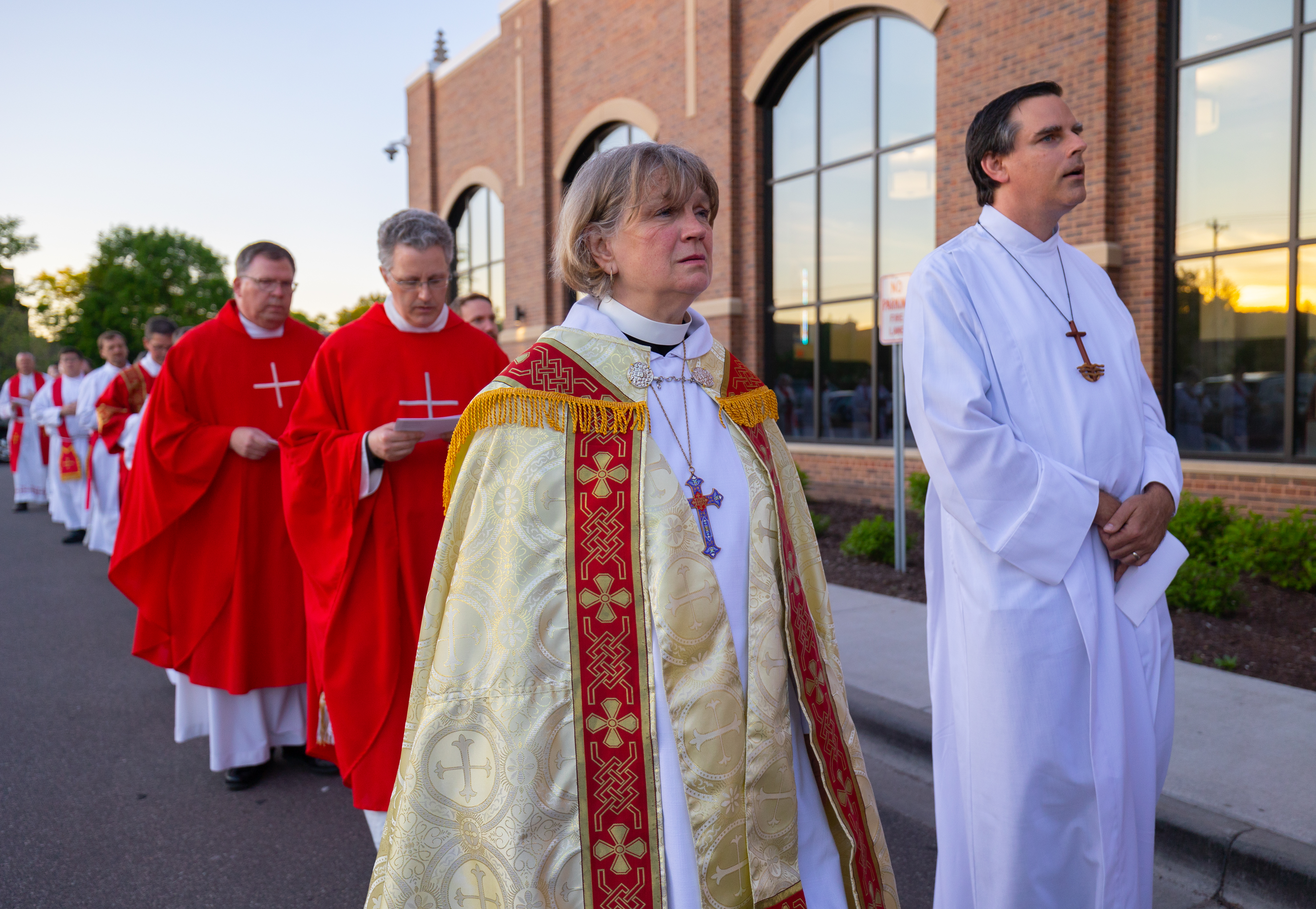Thankful Ecumenism
The body of Christ in Minnesota is stronger today than it was in May.
The mission of the Minnesota Council of Churches is to manifest the unity of the body of Christ and to build the common good in the world. Our mission is necessary because it can sometimes be hard to believe that there is any unity in the body of Christ at all – especially after we have seen how different Christians respond so differently to public health guidance around the COVID pandemic.
These distinctions were present when MCC began convening heads of communion with public health experts on a regular basis in March 2020. Trustworthy information was scarce, yet we knew that institutional leaders faced unique challenges in managing sometimes surprising feelings and rule sets while trying to remain authentic to their faith and practices. So instead of making these meetings closed just to MCC board members: we invited in our friends from the Minnesota Rabbinical Association, Transform Minnesota and the Catholic Archbishop and Bishops around the state to hear the same information, to ask the same questions, and to speak with each other about how to fight the disease of COVID during times none of us had ever lived through.
There was unity in the opening and closing prayers to these events, and in the respectful attention each judicatory head paid to the data shared by – usually – the Minnesota Department of Health. There remained great diversity in how different judicatories and decision-makers chose to lead their institutions through the years to come.
Yet we grew in relationship. We grew in our ability to model civil disagreement. From the relationships forged over our pandemic problem-solving and information sharing other partnerships arose. Because we were in a shared place of vulnerability, we grew in our trust of each other’s good intentions. We held space for each other after the murder of George Floyd as Minnesota became the center of a new national civil rights movement. Some of us connected in racial justice advocacy; others in sharing the religious observance of our state’s 20th year since 9/11 commemoration.
"We grew in our ability to model civil disagreement."
And, at the first Synod organized by the Archdiocese of Saint Paul and Minneapolis to be held in 84 years, two Protestants served as ecumenical observers. MCC board member Bishop Anne Svennungsen of the Minneapolis Area Synod ELCA was invited. The Minnesota Council of Churches was also invited to send a representative so I went as MCC staff, the Director of Strategic Relationships.
Bishop Anne Svennungsen, Minneapolis Area Synod ELCA, and Rev. Jerad Morey, Minnesota Council of Churches, in procession. Photo by Dave Hrbacek, courtesy of Catholic Spirit.
I learned so much about the greater body of Christ in Minnesota from attending the Archdiocese of Saint Paul and Minneapoli Synod from June 3-5 as an ecumenical observer. Invited by Archbishop Bernard Hebda, with whom MCC heads of communion have been in community through the above-named initiatives, the MCC representative was to participate in worship and table conversation as the 500 gathered disciples of Christ sought to set priorities and name opportunities that will shape their ministry together for the next generation. As reported in Catholic Spirit, that judicatory’s newspaper, I was eager to learn how this branch of the Body was in discernment over issues that concern all branches, such as effective youth ministry, and to learn where their discernment would differ significantly from that of my own United Methodist tradition.
I learned that the Holy Spirit is alive and well in the Archdiocese of Saint Paul and Minneapolis.
Going in to the experience I had known that there would be nightly worship, that I would be vested, and that each service would have communion. I would be expected not to partake of the Eucharist and instead to receive a priestly blessing – so by the end of the weekend I was thrice blessed! What I did not know was how fundamental the Eucharist was not simply as a doctrinal fence separating Catholics from Protestants but as an experiential element of the lay Catholic’s relationship with God. Over the weekend I often heard lay people describe the Eucharist as the “source and summit” of their faith. While Protestants and Catholics have famously different perspectives on what happens during what we call communion, I gained an appreciation for how what I was taught in seminary was a doctrinal difference is in actuality a disciplines that shapes how the lay people connect with Christ. Sharing this revelation of mine at one table, two of those present paused for reflection and one seemed to realize for herself how precious that unique aspect of their tradition was for her. While to be sure not everyone I spoke to held the Eucharist at the center of their faith, the taking and adoration of the Eucharist are certainly spiritually nourishing for a great many of our Christian siblings in that faith in a distinct way.
In addition to the Holy Spirit’s presence felt in the lives of those whose spiritual practices centered around the Eucharist, I believe the Spirit was present in how Archbishop Hebda and his design team orchestrated the Synod overall. Remember, this is an event which last occurred 84 years ago. It may well be meant to shape the Archdiocese’s priorities for the next 80. Conversations seeding it began four years ago. After various listening sessions and focus groups, now In Abp. Hebda’s own words he was “putting all my faith in the Holy Spirit” and its work at conversation tables. Their job was deciding which of 40-some priorities would orient the Archdiocese’s ministry. The Synod’s priorities were divided into three groups and all present (except us ecumenical observers) were given the ability to cast votes deciding the top priorities in each group. The results of these votes were then publicly displayed, creating an avenue of potential accountability should any clergy or laity feel in coming years that a certain priority was not being met.
The Spirit was certainly present in the gentleness, robust dialogue and difference, and confessional language used in the table conversations. And in the random selection of individuals to share with the large group what had emerged for them: Some of these contributions were challenging, some affirming, some illuminating and encouraging, some emotionally charged. And this part of the body of Christ flexed its muscles and grew stronger from the experience.
"Some valued the outsider’s perspective an ecumenical observer brought to the conversation. Some took it as a hopeful sign that their clergy were involved in the life of other parts of the church writ large."
There was a spirit of good will among the attendees as well. Many stopped to thank me for my presence there. Many felt comforted to learn that other traditions are grappling with the same aspects of living out the faith in 21st century America as they are. Some valued the outsider’s perspective an ecumenical observer brought to the conversation. Some took it as a hopeful sign that their clergy were involved in the life of other parts of the church writ large. It was good for them to know that the unity of the body of Christ was made manifest in the presence of an ecumenical observer, and it was good for me to see how healthy this part of the body of Christ in Minnesota can be.


